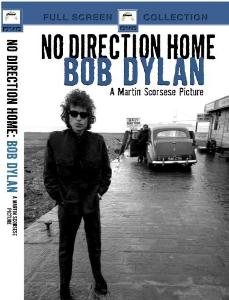 Finally got around to watching Scorsese's long doc on Dylan that revolved around his emergence as a folk artist and then the incredible Newport Folk Festival moment in 1965 when he pulled out an electric blues band, played only 15 minutes as the headliner to massive booing, and never looked back.
Finally got around to watching Scorsese's long doc on Dylan that revolved around his emergence as a folk artist and then the incredible Newport Folk Festival moment in 1965 when he pulled out an electric blues band, played only 15 minutes as the headliner to massive booing, and never looked back.
I don't really know Dylan's music that well beyond the big singles, but I've heard a lot about how brilliant and encyclopedic his knowledge of old American musical styles and traditions. I think I read that in the assessment of one of his latest series of albums (which folks have said are a remarkable run on their own). Watching this film is an introduction in some ways, but Scorsese does not focus on the chronological assessment of Dylan's ever-changing, ever-expanding musical persona, nor of his recorded output. I think it wisely looks at him from different angles and perspectives, including those of Joan Baez, whose heart he obviously broke, Allen Ginsburg in interviews that were late in his remaining life but quite riveting and dynamic, band members and producers, and other fellow artists like Pete Seeger and Peter Yarrow.
All I can say about the collective impact of the more than 3.5 hours of this documentary (took up two picks on my netflix rotation) is that it really made me think about bucking expectations, staying true to what you have inside, and trusting your voice. Baez has a really telling segment where she described what it was like to be active and political (and linked to him) once he'd moved on from topical songs and traditional folk, when she performed at protests and sit-ins and people asked for Bob: she had to say "he's not coming. He's probably never shown up, you poor fools."
It was so interesting to hear her talk about it - particularly because she's still doing that circuit more than 40 years later. It made me wonder about political art, actually, which I value so much in the Asian American context. Dylan's path gives us the rare opportunity to look at both forks in the road for artists (particularly with Baez or Seeger as a foil)... and activists, actually. He wrote some of the finest songs of his generation that captured the mood, inspired other great work (Sam Cooke wrote "A Change Gonna Come" after hearing "Blowin' in the Wind" and wondering why it was a white man who wrote it), and are still sung today. He then just had to move on.
Should we take note of this - not just in a creative context, but in movement work too? Sometimes I come across folks who haven't reinvented themselves and are still using the same rally chants and tactics (like street protests and petitions) as they've been using for decades. It seems like sometimes folks get so locked in, even when they're not that good at something, that they don't evolve or they stay the same to meet the expectations put onto them by followers or admirers. I wonder if that's true in a lot of contexts, actually, including civil rights leaders who still seem locked into a vision of America from the 50s and 60s, one that is not as diverse nor as complex as that which we work in now. These outdated models, and the people who continue to push them, may stall the evolution of movements for progress. And those are people who were actually once effective.
As a related aside (jumping back to the artist/activists thread) maybe the Two Tongues crew closed shop at the right time. They remain powerful (one of their tracks just came up on my Shuffle last night and the passion rocked my consciousness all over again), and they continued to evolve as individuals. It's a good lesson to keep in mind, and the film definitely hits that point for me. Strongly recommended for music fans and fans who consider the balance of consciousness and the creative process.
Nov 11, 2008
Film: No Direction Home (2005)
Posted by
Rage
at
11/11/2008
![]()
Subscribe to:
Post Comments (Atom)


1 comment:
Definitely gonna check this one out. Thanks for posting.
Post a Comment